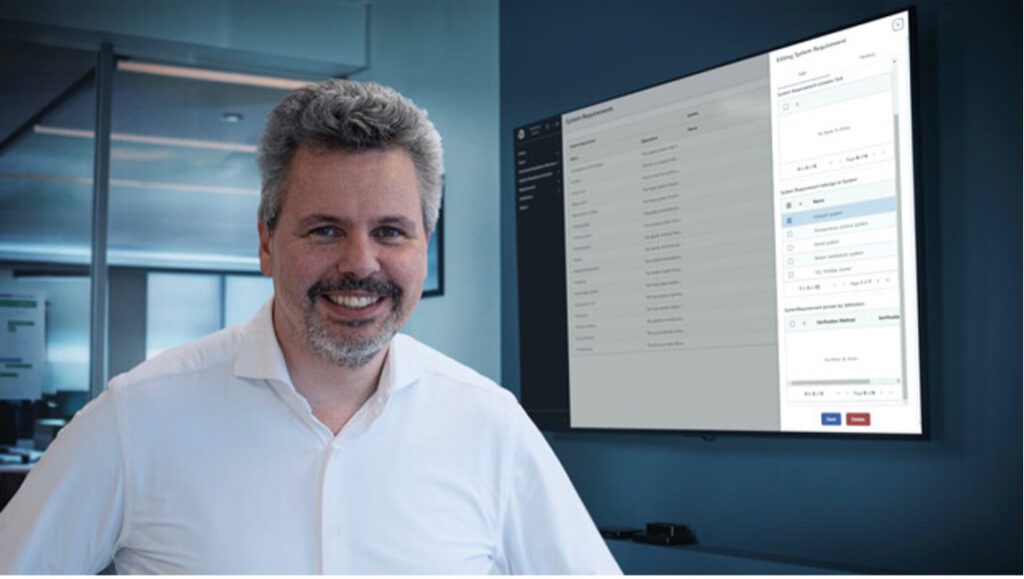Systems engineers with field and industry knowledge play a crucial role in software implementations. Their deep understanding of both technical and operational aspects ensures seamless integration of software into existing systems. Martijn van Loenen, director at Van Loenen Consultancy, states: “There is a common misconception that only consultants from software suppliers are adequately equipped to meet in-depth, industry-specific requirements. However, they often lack essential knowledge about the strategic use of software within current projects. The synergy approach, or ‘1 + 1 = 3,’ is essential for effectively solving complex challenges in sectors such as engineering, production, and construction.”
In the Netherlands, many tenders are continuously initiated. Martijn explains: “In practice, the requests from clients, as noted in the tender, often do not fully match their actual needs. This almost certainly leads to additional costs. I have seen project tenders with an initial budget of €100,000 rise to €150,000 or more. This often happens without stakeholders being fully aware of the reasons for these cost increases. Although such increases are allowed under procurement law, the question arises whether this is both ethically and operationally justified. More importantly, could this have been prevented?”
The answer is clear. Martijn states: “Systems engineers with sector knowledge better oversee both the technical and operational aspects of a project, unlike consultants from software companies who often only approach the software side. By utilizing the extensive expertise of systems engineers, the actual needs of a client can be identified more accurately and timely. This significantly reduces the risk of budget overruns and unforeseen costs.”
Looking for the Dutch version of this article? See this page.
The high costs of lacking industry Knowledge in software supplier consultants
Incorrect software implementations due to a lack of sector insight can have significant financial implications. Martijn explains: “Costs for revisions, delays, and inefficiencies often skyrocket when the implemented solutions do not meet the client’s actual needs.” Let’s zoom in on these financial implications.
Revisions/Adjustments: Projects lacking field knowledge frequently lead to multiple rounds of revisions. Each revision incurs additional costs, both in labor hours and material expenses.
Delays: Project delivery delays are a direct consequence of incorrect implementation. In extreme cases, these delays lead to penalties and almost always result in lost revenue and/or increased operational costs.
Inefficiencies in business processes: Software that does not align well with business processes results in inefficiencies, leading to higher operational costs as employees spend more time on manual corrections and workarounds.
Maintenance and support: Poor initial implementation increases the need for ongoing support and maintenance, requiring extra resources that could have been invested in growth and innovation.

How engineers with both software and sector expertise add value
Can it be done differently? Martijn and his team at Van Loenen Consultancy believe so. “Our team consists of systems engineers with field and sector knowledge. They are happy to play that crucial role in software implementations. Their deep understanding of both technical and operational aspects ensures seamless integration of software into existing systems.”
When engineers have a thorough understanding of both the technical capabilities and the sector they work in, it directly impacts the project. Here are the top 5 benefits:
- Identifying relevant requirements: Systems engineers with field and sector knowledge understand which software functions are essential for daily operations within the sector.
- Insight into operational processes: increasing efficiency: By understanding both software and the sector, systems engineers can optimize processes and reduce bottlenecks.
- Providing innovative solutions: Systems engineers with field and sector knowledge are better able to think outside the box and design innovative solutions tailored to the sector.
- Faster problem solving: Systems engineers with dual expertise can identify and solve problems faster because they know how software behaves within specific operational environments.
- Effective Communication: Systems engineers with field and sector knowledge act as a bridge between IT and operational teams, reducing misunderstandings and improving collaboration.
Practical example: Amsterdam Road Tunnels
What does this look like in practice? The Amsterdam road tunnels are a good example of how two worlds come together. In this project, a library was developed as a basis for multiple projects. Martijn explains: “The goal was to ensure a structured and consistent approach so that specifications and requirements were clear and applicable. The document used for this was called the ‘Amsterdam Tunnel System’ (ATS). When we reviewed it, many ambiguities quickly emerged, such as missing information and undefined responsibilities. To address these issues, we helped develop the Standard Tunnel Amsterdam (STA) according to the principles of Model-Based Systems Engineering (MBSE).”
The ATS was initially created in Word. Martijn notes: “We developed the STA according to system architecture. It works much better. For example, if a fan is needed, it must meet specific requirements. By using models with a standard structure and a smart library, we ensure that everything fits and works. By incorporating experiences with deviations in your library, you ensure that the next project runs even better and more efficiently.
What often goes wrong with standard libraries is that feedback from projects is not well documented. Feedback from projects can be included, and this new knowledge can be passed on to ongoing and future projects. This makes the system better over time.
Another misconception is that a complete library must be available before projects can use it. But when is a library ever complete? Often, it is thought that the library is complete once the first project starts. However, a library is never really complete. There can always be missing knowledge, errors, or solutions that do not work well in practice.
Only by actually using the library and collecting and processing feedback does it improve over time. And so do your projects. This process makes the library and your projects ultimately correct, complete, and consistent.”
Martijn continues: “Many people equate a system library with the project environment, but a library behaves differently. A library contains your completed knowledge, innovations, and useful information you have documented. You incorporate knowledge from previous projects and build on your current knowledge. Additionally, you store information in this library. If done well, you can prevent mistakes.”
An important prerequisite for a well-functioning library is assigning ownership and responsibility. Martijn states: “There must be a clear escalation route, with an authorized person ultimately responsible for the standard and the management of the library. This prevents miscommunication and ensures consistency and quality. By making good internal agreements and clearly defining responsibilities, we can effectively solve these challenges and strengthen our teams and projects.
Thanks to our engineers’ extensive field knowledge, this project was a success.”
Systems engineers with field knowledge are not just technicians; they are a strategic partner who contributes to the success of software implementations.
– Martijn van Loenen, Director at Van Loenen Consultancy
About Van Loenen Consultancy > Proud member of INCOSE
Van Loenen Consultancy is an expert in structuring projects and complex configurations with Systems Engineering and information management systems. Since 2008, our engineers have made a difference with our integral concept, utilizing extensive knowledge and skills in both Systems Engineering and Model-Based Systems Engineering, and the technology behind semantic databases. We offer services such as structuring processes and data, project support, application development, and integrations. Van Loenen Consultancy specializes in Relatics, TopTeam, SharePoint, and Datastorms, effectively solving complex issues and managing and supporting the entire cycle of a project or product.
Martijn concludes, “As a team passionate about the application of Systems Engineering, Van Loenen Consultancy has recently become a member of the International Council on Systems Engineering (INCOSE).”
